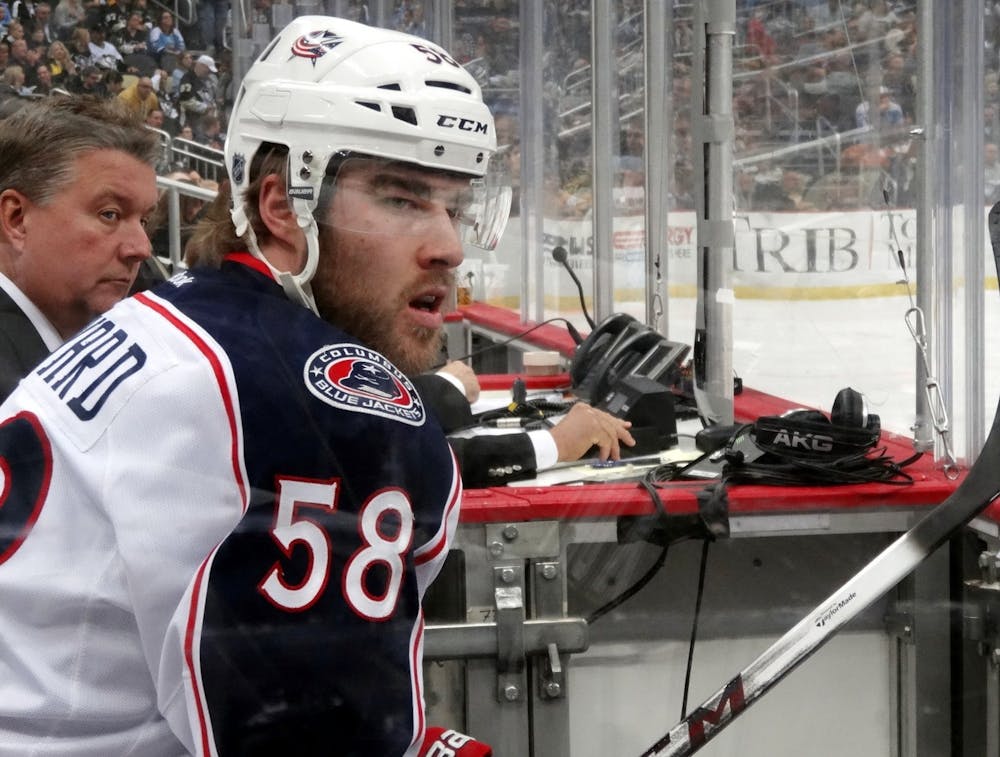
What may be the weirdest trade deadline ever has come and gone. While less eventful than the average non-pandemic trade deadline, several consequential moves were made. The Washington Capitals shocked the hockey world when they traded promising young forward Jakub Vrána, along with first- and second-round picks and Richard Pánik, to the Detroit Red Wings for Anthony Mantha.
The Tampa Bay Lightning and Toronto Maple Leafs paid up for the finishing touches with David Savard and Nick Foligno. The Boston Bruins added star forward Taylor Hall and a solid defenseman in Mike Reilly without giving up much. Beyond the well-documented influence of the flat salary cap and the upcoming Seattle Kraken expansion draft, several key trends and questions arose out of this year’s deadline. Without further ado, let’s take a look.
If it’s your year, pay up and go get your number one guy — and it is a great year to be the Columbus Blue Jackets.
Tampa Bay may be an all-time great team and have a high chance of winning back-to-back Stanley Cups this year, but they will be facing extreme salary cap issues. Still, they are all in and can afford to pay a premium for the right piece to be the icing on the cake. They did it with Blake Coleman and Barclay Goodrow last year, and it worked. Savard was their guy, and they understandably paid up to get him.
By contrast, Toronto is a very good team that is enjoying the one-year benefit of not being in the same division as Tampa Bay or Boston. They have also done an impressive job pivoting a roster entirely focused on offense into a highly capable offensive team that also finally plays good defense and has some grit. When you get a one-year break from having to beat both Tampa Bay and Boston to make it out of your division, you go all in.
Toronto decided that the Columbus Blue Jackets’ Foligno and his leadership and defensive acumen were the pieces that they needed, and they weren’t going to lose him to another team. They paid up and got their guy.
Columbus enjoyed the gift of having two teams who were enamored with their two pending free agents. Netting two first-round picks for Foligno and Savard was extremely impressive. They lucked out big time and should be ecstatic about this unexpected surprise as they look to retool an intriguing but hole-filled roster.
The Buffalo Sabres didn’t have a good trade deadline, but we’re being too hard on them.
After Foligno and Savard each fetched first-round picks, the Buffalo Sabres got grilled for trading the top prize in Hall a day before the trade deadline for just a second-round pick (in addition to the rather even swap of Curtis Lazar and Anders Bjork). However, reading between the lines, Hall admitted to leveraging his no-move clause to force a move to Boston.
Sure, it hurts for Buffalo that they only netted a second-round pick for a former Most Valuable Player who analytics suggest has been unsustainably unlucky this year. However, when a player has a full no-move clause and sets his sights on one specific team, it’s hard to fault the team.
What were Anaheim, Nashville and Arizona thinking?
The Anaheim Ducks, Nashville Predators and Arizona Coyotes just missed a major opportunity. Tampa Bay really wanted Savard and paid up accordingly because they can afford to perfect their team with their preferred finishing touches, but the key reason he fetched a first-round pick is that he was the only proven top-four defenseman on the market.
Nashville held onto valuable assets in Mattias Ekholm, Filip Forsberg and Mikael Granlund when they could have gotten a king’s ransom due to the lack of defenders and surprisingly high prices of some rentals at this trade deadline. If Savard and his expiring contract are equivalent to a first-round pick, Ekholm would net a first-round pick, top prospect and additional noteworthy asset or decent pick. Ekholm is a better player than Savard, who is under contract for one more year, making this an absolute bargain.
Regarding Forsberg, Nashville could have gotten a haul. Sure, Washington paid up for Mantha because he is signed for three additional years, and he’s a tantalizingly intriguing power forward, but Nashville is foolish not to have explored whether they could have netted Vrána or other comparably valuable assets in a deal for Forsberg. Unlike Ekholm and Forsberg, Granlund and Erik Haula wouldn’t have netted game-changing assets. However, with Mattias Janmark netting Chicago’s second- and third-round picks, Granlund and Haula could have netted some mid-round picks to seal the deal.
Nashville bypassed a chance to garner a combination of multiple first-round picks and established young players and prospects, along with several mid-round picks, for the possible privilege of getting crushed by powerhouse Tampa Bay or a very good Carolina Hurricanes in the playoffs. It was a missed opportunity for the team to revitalize on the fly and significantly improve their future.
Even in the context of Nashville’s missed opportunity, perhaps Anaheim’s situation is even more perplexing given that there is no chance that they are going to make the playoffs this year. If we are being realistic, it also seems unlikely Anaheim will be a legitimate contender next year. So why hold onto pieces like cost-controlled forward Rickard Rakell, who is under contract for this year and next?
Rakell’s contract and player profile is a dream for a contending team but of very little value to an Anaheim team that won’t be contending while he’s under contract. As we saw with Kyle Palmieri, waiting to trade Rakell until a team only gets one playoff run with him will significantly reduce the return. Anaheim held onto players who are unlikely to be with the team when it is a true contender for little reason. It was a missed opportunity to gain the last round of assets to finish off the rebuild.
Lastly, perhaps Arizona made the least consequential mistake of not selling at the trade deadline because they didn’t have any particularly significant assets to move. However, in a market short on defense with three defensemen on expiring contracts and a franchise incredibly low on draft picks after losing high draft picks in a prospect testing scandal, it seems illogical that Arizona stood pat and didn’t trade any of its defensemen. These defensemen would be attractive to contending teams to get a first-round date with the league-leading Colorado Avalanche and their impressive over 50 goal differential.





